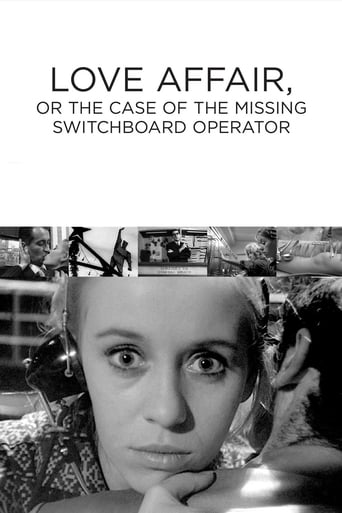treywillwest
This is not only a great little movie, but also a great time-capsule of late-'60s Yugoslavia (a nation since destroyed by way of violent imperialist intervention). A young Hungarian woman and an older, Serbian man enter into a relationship under the internationalist, multi-ethnic, mid-twentieth century culture of communist Yugoslavia. This work contains scenes of beautiful, deeply moving, intimacy and sexuality. The contradictions of this culture are made plain within the movie by reference to scenes from a Russian revolutionary film by Dziga Vertoz: Committed communist masses dismantle an old Cathedral- their cause is clearly popular and democratic, yet it is intolerant of an institution that has itself embodied intolerance for millennia. "Revolutionary", "scientific" humanity remains constellated within a dialectic of resentment. Ultimately, human frailty destroys both the Hungarian and the Serbian. Misunderstanding and jealousy cause the lovers to turn on, and destroy, each other within the the terms set forth by this "revolutionary" society. Progress creates the illusion of enlightenment. But ultimately it is human nature that decides our fate. This outlook ultimately qualifies writer-director Dusan Makavejev as a philosophical reactionary, albeit an exceptionally creative one.
framptonhollis
Early on in his wildly experimental career, Dusan Makavejev was proving himself to be one of world cinema's most unique talents. With his brilliant, genre bending masterpiece "Love Affair", he crafts a simplistic, beautiful, and devastating portrait of one of film history's most tragic romances. Of course, Makavejev's vision is not limited by the boundaries of conventional storytelling and tone. Spliced in between the romantic tragicomedy are interviews with a sexologist and a criminologist, as well as various bits of stock footage depicting Yugoslavian politics.This often weird and humorous version of a brutally sad tale is among my new favorite films thanks to its entertainment value, stunningly unique vision, wild sense of humor, and strong emotional impact. Makavejev pulls no punches, he allows the tragedy to burst in a chaotic explosion of tears, refusing to hold back. By the end, i was so struck with melancholy that I could hardly believe what I had just witnessed. This is a film that combines so many themes and genres, and yet manages to portray a semi-tradition story that anyone can follow. Sprinkling bits and pieces of the charmingly surreal and avant garde all over this saddening love story, Makavejev forms one of the finest, most unfortunately underrated and obscure cinematic romances of all time.
chaos-rampant
Film for me is a matter of apprehension, of temporal experience of who you are relative to what is playing before you. So I don't care about a historicist or cinematic scholarly approach to films, in that film (and history) by itself is nothing, a carved artifact. This is my way of saying that there are probably several reasons to find this interesting, as token of 60s Yugoslav mores and 60s New Wave, admire the technique, which is wonderful in its freedom and placing. But for me, none of that matters when it doesn't enliven me.A sexologist opens the film by humorously explaining the hidden omnipresence of sex in all we do, establishing the essence of the film as something to be secretly whispered and discovered.The film follows a relationship between a rat exterminator and a blonde switchboard operator around Belgrade, the ups and downs. Salad days, captured with deliberate languidness. Eventually, there is betrayal and tragedy.The point seems to be, contrasted levels of apprehension: everyday life in the affair in its dullness, small joy and unpredictability, with the system that frames that life as story, attempting to explain: 'experts' lecture on various topics, polemic footage of revolution play in ironic celebration, histories are recounted in voice-over. But you'll note, for instance, that the sexologist makes up nearly everything he says: Rembrandt did not paint sex, Mesopotamian priests did not sit ontop of a phallic column for days. The same fabrication then extends in the footage of joyous communist parades, a similarly subversive ploy is found in the silent Mr. West in the Land of the Bolsheviks.But it's a weird, incongruent alignment of cycles that fails and fails to build for an hour. One hour felt like two. A big reason seems to be that this sort of bare observation was fresh at the time, but overly familiar now so all the vitality has been zapped out.It just wastes what could have been a tremendously powerful last scene, where so much of what we see could be toyed with as different levels of involved understanding: a murder has been set up early in the film, but we don't know it's going to feature in the story, the different levels are that suddenly we are aware of what's coming (the murder), unexpectedly what we find out (that it was an accident), and what were the human emotional dynamics (regret and despair, not hate). Imagine the richness..
masked film critic
That European cinema did things differently in the 1960s is not in doubt, as even directors from little-renowned cinematic cultures such as Yugoslavia delighted in new-found freedom. On one hand, "Switchboard Operator" is a simple tale of love, betrayal and tragedy in Belgrade, and as such captures some touching details about trapped lives in a totalitarian society. However, director Dusan Makavejev, clearly under the influence of Godard, adopts an offhand approach to his narrative, and introduces extraneous material at tangents to the main story. Most of this stuff is fascinating, particularly when he uses archive footage of Yugoslav history. Less successful are the interjections of two tedious academics, a sexologist and a criminologist, whose stern pronouncements jar against the film's capricious tone. Nonetheless, this is invigorating film-making which reaches into some strange regions. Despite an economical running time of 69 minutes, the film even finds time for a brief history of how the grey rat infested Europe!



